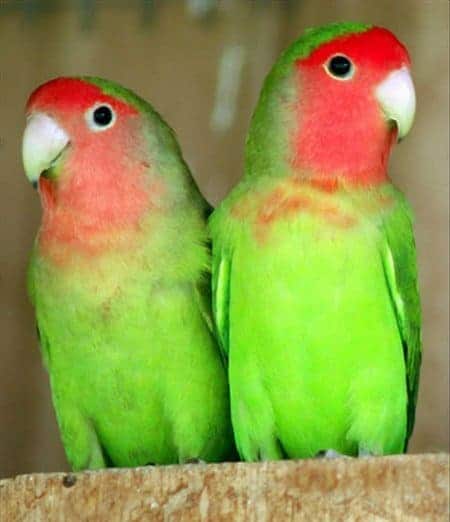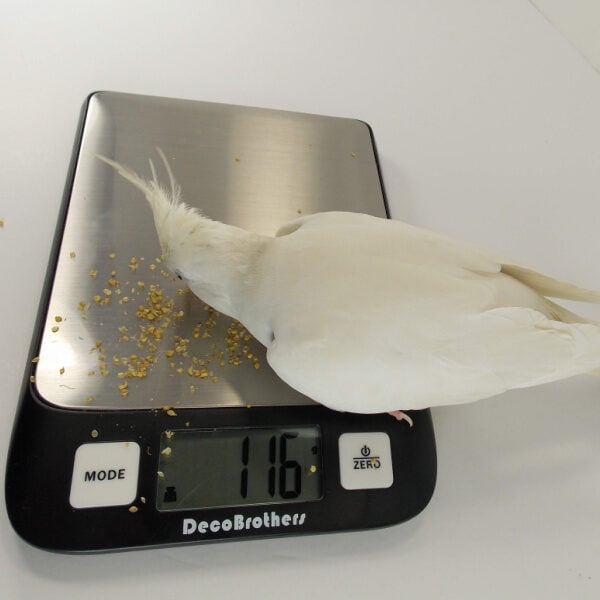Last Updated on by Mitch Rezman
I have 2 love birds that are approaching 20 years of age – Help Scout
Beth W replied Feb 5, 12:42pm
I have two love birds that are approaching 20 years of age and was wondering if there are special nutrition or habitat changes I should make for them.
Mitch replied Feb 8, 10:09pm
Beth – do you know their sex?
Beth W replied Feb 9, 6:29pm
They are both male peach faced love birds, one is a year older than the other. The older bird is having problems with his balance occasionally.
Falls off perches, Last year the vet did some blood work and said the only issue was high testosterone and gave him 4 hormone shots. Really didn’t seem to help. Their main food is Harrison’s High Potency Fine pellets and millet on occasion as a treat. I have a couple of platform perches and the rest are Booda rope perches.
Mitch replied Feb 13, 4:38pm
In terms of nutrition, your birds are on a high-quality pelleted diet. It’s working let’s not fix whats not broken.
If you’re not doing so already it may be fun to offer some foraging/enrichment opportunities like putting pellets or fun treats like sunflowers seeds) in the bottom of a small box and covering it with tissue paper balls, vine balls, drinking straws and the like.
When a bird is falling off of perches, we begin to introduce more platforms (what you have done) but I would also begin to lower everything in the cage so that we can help prevent injuries from potential falls. This ladder may be a nice addition.

In terms of habitat changes, we’ve always advocated to take everything out of the bird’s cage and move it around at least once a month in order to keep them mentally challenged and stimulated.
I’m a little concerned about the high testosterone and the four hormone shots. I’d be interested to find out what exactly the substance injected into your birds was.
If your male is not expressing aggression what would the purpose of the shots be? I’m guessing they were not cheap?
Beth W replied Mar 5, 9:20am
Sorry for the late response, Lupron was the injection Beaker, (my male lovebird) did receive.
He got 4 of them and they did not seem to help his feather plucking around his tail and balance issues at all.
You were rather optimistic stating they cost $50. I was billed $75 and an additional vet visit of $42 for each shot.
I also was advised to separate my two male love birds into separate cages. That ended up making the issue worse for Beaker (he started plucking the neck too). The separation started a plucking problem with lovebird #2 (Gonzo). Gonzo just plucked his neck but stopped when I put them together again.
They are back together now but I still worry about Beaker. I think the falling happens when he is very active, he rests for a bit and then is OK.
I have always done a 12 hour dark and light cycle for them. I have had both of them for over 15 years and the issue with Beaker started a little less than 2 years ago.
Mitch replied Mar 13, 5:52pm
Are their wings clipped and toe nails trimmed? Are their wings clipped and toe nails trimmed? Are you using an “avian” vet?
I’d like to know what the vet was thinking using Lupron – in worst case scenarios it “may” reduce aggression in males but if Beaker was exhibiting no erratic behavior other then the plucking what exactly was a drug used to postpone puberty in pre pubescent adolescents girls supposed to help a 20 year old psittacine?
I’m not understanding why high testosterone levels need to be artificially lowered especially in a 20-year-old bird? I mean what would be wrong with giving him a little practice golf wiffleball and let him for lack of a better term “rub one out” now and then because he has no females to impregnate.
With my brain exploding about this and my need for a veterinary degree. A backyard birder that I am tells me that testosterone levels rise in male birds this time of the year – why do you want to take it away from the bird?
Written by Mitch Rezman
Approved by Catherine Tobsing
Author Profile
Latest entries
 Feeding Exotic BirdsDecember 29, 2025How to Switch or Convert Your Bird From Seeds to Pellets: Real-Life Case Studies and Practical Guidance
Feeding Exotic BirdsDecember 29, 2025How to Switch or Convert Your Bird From Seeds to Pellets: Real-Life Case Studies and Practical Guidance Feeding Exotic BirdsDecember 16, 2025A Practical, Budget-Smart Guide to Feeding Birds Well
Feeding Exotic BirdsDecember 16, 2025A Practical, Budget-Smart Guide to Feeding Birds Well Bird EnviornmentsDecember 7, 2025Understanding Budgie Cage Bar Orientation: Myths, Realities & Practical Solutions for Vertical-Bar Bird Cages
Bird EnviornmentsDecember 7, 2025Understanding Budgie Cage Bar Orientation: Myths, Realities & Practical Solutions for Vertical-Bar Bird Cages Feeding Exotic BirdsDecember 5, 2025How Dr. T.J. Lafeber Rewrote the Future of Pet Bird Nutrition
Feeding Exotic BirdsDecember 5, 2025How Dr. T.J. Lafeber Rewrote the Future of Pet Bird Nutrition



